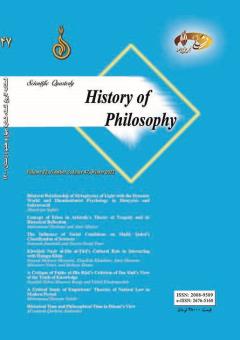The Influence of Social Conditions on Mullā Ṣadrā’s Classification of Sciences
Subject Areas : Connection of philosophers’ views and philosophical schools with the social and philosophical conditions of the timeFatemeh Jamshidi 1 , Nasrin Serajipour 2
1 - MA student of Islamic Philosophy and Kalam (corresponding author), Shahid Beheshti University, Tehran, Iran
2 - PhD in Comparative Philosophy, Imam Sadiq University, Tehran, Iran
Keywords: Mullā Ṣadrā, classification of sciences, Islamic gnosis, Illuminationist philosophy, Peripatetic philosophy, Transcendent Philosophy,
Abstract :
During the Safavid era, at the time of Mullā Ṣadrā and upon the rise of court-jurisprudents and pseudo-mysticism, true sciences such as jurisprudence, philosophy, and gnosis were in seclusion. Mullā Ṣadrā, as a religious scholar who was familiar with the philosophical and gnostic ideas before him, tried to eliminate philosophical confusion from the scientific society and oppose this fallacious approach. Hence, he established a new philosophical system in order to bring all previous thoughts together in a consistent manner. In fact, he aimed to clarify the place of true knowledge and the ways of attaining it for society through establishing his own school of philosophy. The classification of sciences is one of the fundamental problems in any philosophical system. However, it is emphasized that each system of philosophy and the collection of its problems are influenced by the social conditions of their time. Similarly, Mullā Ṣadrā’s classification reflects his social concerns and has been developed in response to the social needs of his time and directing them towards true sciences. He has provided a specific classification of sciences in each of the three periods of his scientific life. He followed a peripatetic approach during the first period, an Illuminationist approach during the second one, and a transcendent approach during the third period, which reflected the height of his philosophical maturity. This paper aims to investigate Mullā Ṣadrā’s classification of sciences during each of the three periods of his scientific life and demonstrate how each was influenced by the social conditions of his time, and how each responded to the existing societal needs.
قرآن کریم.
ابنسینا (1404ق) الشفاء (الالهیات)، قم: كتابخانه آيت الله مرعشى.
ابنسینا (1405ق) منطق المشرقیین، قم: كتابخانه آيت الله مرعشى.
بکار، عثمان (1381) طبقهبندی علوم از نظر حکمای مسلمان، ترجمه جواد قاسمی، مشهد: بنیاد پژوهشهای اسلامی.
جعفریان، رسول (1389) صفویه در عرصه دین، فرهنگ و سیاست، قم: پژوهشگاه حوزه و دانشگاه.
خزائیلی، محمدباقر؛ منتظر القائم، اصغر (1395) طبقهبندی علوم در تمدن اسلامی با تأکید بر نقش ایرانیان (قرنهای سوم تا یازدهم هجری)، قم: پژوهشگاه حوزه و دانشگاه.
رعدی، علی (1386) «اخباریان و نقش آنان در تاریخ شیعه»، اندیشه نوین دینی، شمارة 8، ص132ـ 107.
شریفی، احمدحسین (1381) «رابطه عقل، عرفان و وحی از دیدگاه صدرالمتألهین»، معرفت، شمارة 62، ص31ـ25.
شیرازی، قطبالدین (1369) درة التاج، تهران: حکمت.
طباطباییفر، محسن (1384) نظام سلطانی از دیدگاه اندیشه سیاسی شیعه (دوره صفویه و قاجاریه)، تهران: نشر نی.
طوسی، سیدخلیل الرحمن (1393) درآمدی بر فلسفه سیاسی صدرالمتألهین، قم: پژوهشگاه علوم و فرهنگ اسلامی.
فارابی، ابو نصر (1405ق) فصول منتزعه، تهران: كتابخانه الزهراء (ع).
لکزایی، نجف (1381) اندیشه سیاسی صدرالمتألهین، قم: بوستان کتاب.
لکزایی، نجف (1388) «طبقهبندی علوم از دیدگاه صدرالمتألهین و امام خمینی (ره)»، خردنامه صدرا، شمارة 57، ص52ـ42.
لکزایی، شریف (1395) فلسفه سیاسی صدرالمتألهین، قم: پژوهشگاه علوم و فرهنگ اسلامی.
ملاصدرا، محمدبن ابراهيم (1381) کسر أصنام الجاهلیة، تهران: بنیاد حکمت اسلامي صدرا.
ملاصدرا، محمدبن ابراهيم (1382) شرح و تعلیقه صدرالمتالهین بر الهیات شفا، تهران: بنیاد حکمت اسلامی صدرا.
ملاصدرا، محمدبن ابراهيم (1383) الحكمة المتعالية فى الأسفار الأربعة، تهران: بنباد حکمت اسلامی صدرا.
ملاصدرا، محمدبن ابراهيم (1386) مفاتیح الغیب، تهران: بنیاد حکمت اسلامی صدرا.
ملاصدرا، محمدبن ابراهيم (1387) المظاهر الالهية فى اسرار العلوم الكمالية، تهران: بنیاد حکمت اسلامي صدرا.
ملاصدرا، محمدبن ابراهيم (1389) مجموعۀ رسائل فلسفی، تهران: بنیاد حکمت اسلامی صدرا.
ملاصدرا، محمدبن ابراهيم (1390) رساله سه اصل، تهران: بنیاد حکمت اسلامی صدرا.
ملاصدرا، محمدبن ابراهيم (1393) شرح هدایةالأثیریة، تهران: بنیاد حکمت اسلامی صدرا.
نوایی، عبدالحسین؛ غفاریفرد، عباسقلی (1381) تاریخ تحولات سیاسی، اجتماعی، اقتصادی و فرهنگی ایران در دوران صفویه، تهران: سمت.
یزدانپناه، یدالله (1398) سنت عرفانی اسلامی، سخنرانی در پنجمین دوره طرح ملی گفتمان نخبگان علوم انسانی، طرح ملی گفتمان نخبگان علوم انسانی.


